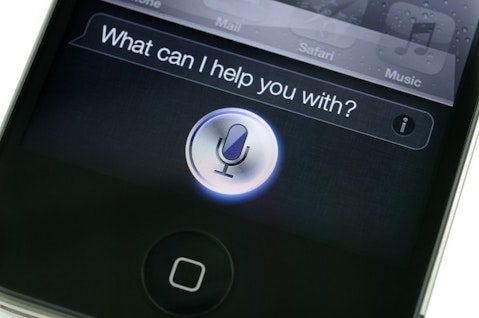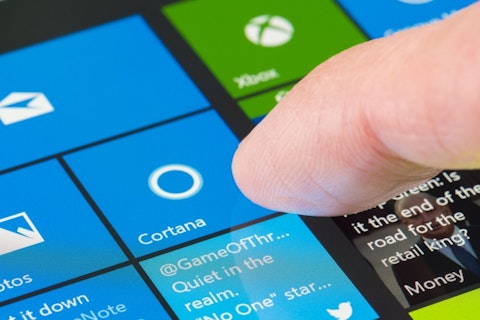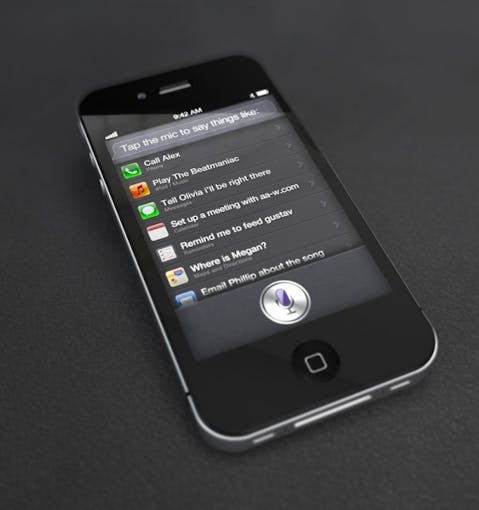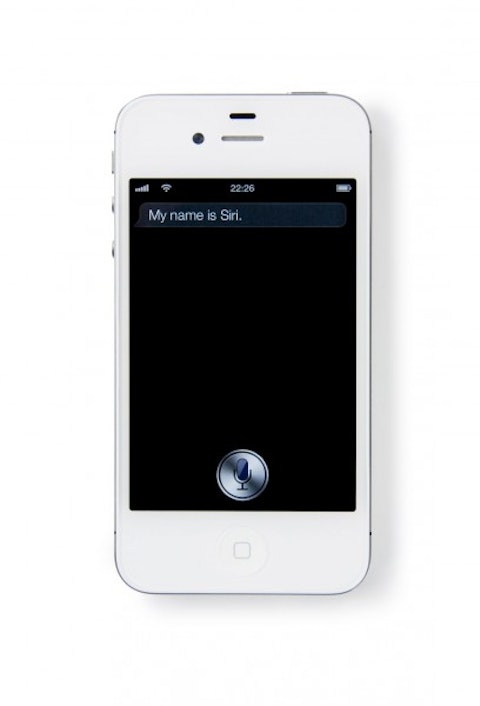Before we proceed with the battle we call Cortana vs. Siri vs. Alexa vs. Google Assistant: The Best AI, we turn first to the world of comics. Marvel fans, whether of the comics or the lucrative movie franchise, will surely recognize Jarvis, the artificial intelligence (AI) assistant that Tony Stark speaks to at home or while he’s fighting baddies as Iron Man. Before Jarvis’ transition to the Vision, the AI assistant was responsible for managing the billionaire’s home and making sure that Stark’s Iron Man suits are in tip-top condition. It’s like a do-all genie, without the lamp that needed some dusting.
Right now, tech giants are like real-life versions of Tony Stark; they develop game-changing products and services that move us closer to the future we see on movies and TV. These titans of the industry have started developing and refining, among other things, a helpful AI assistant capable of two-way conversation with the user.
Apple Inc. (NASDAQ:AAPL) was first to launch such an assistant, Siri for the iPhone, in 2011, and it quickly became one of the distinguishing features of the company’s devices. It was inevitable that rivals soon catch up. Google Inc., back in 2012 before it reorganized into Alphabet Inc. (NASDAQ:GOOGL), started offering Google Now, but while it was a good and informative personal assistant, it can’t talk back to users the way Siri did. Microsoft Corp. (NASDAQ:MSFT) then followed with Cortana three years later, while Amazon.com, Inc. (NASDAQ:AMZN) debuted Alexa for its own line of home speakers a year after Cortana’s launch. Google then started burying Now in 2015, in preparation for the eventual launch of the Google Assistant in 2016.

Copyright: niserin / 123RF Stock Photo
Speaking of Alexa, it is the central feature of the Amazon Echo speakers. Insider Monkey has previously written about 10 Things You Can do With Amazon Echo by speaking to Amazon’s AI assistant.
As we can see, Apple’s Siri has a headstart of at least three years compared with its rivals. Such first-mover advantage had people remembering Siri more as the AI assistant of choice. However, we know that in the tech world, things catch up fast. Although, for our money, things can’t develop fast anough, and not a single one of these apps can hold a candle to Jarvis. But to see which AI assistant is the best for you, we offer you this bot-to-bot-to-bot-to-bot battle Cortana vs. Siri vs. Alexa vs. Google Assistant: The Best AI.
Siri
Since Apple Inc. (NASDAQ:AAPL) launched Siri in 2011, the AI assistant expanded its functionality to other Apple devices like the Mac, the iPad, and Apple TV set-top box, as well as the iPhone maker’s the CarPlay car entertainment system, and the HomeKit smart home service. From the get-go, what users found notable about Siri is its disarming personality and sass with answering users’ questions. As a feature mainly associate with the iPhone, Siri has been tagged as an on-the-go assistant useful for providing quick answers and executing basic tasks. Siri has had its fair share of criticism, particularly from people who want more regarding Siri’s ability to provide answers, but Apple Inc. has since expanded Siri’s capabilities and added support for third-party apps in 2016, along with the launch of the iOS 10.

Copyright: bedo / 123RF Stock Photo
Google Assistant
As far as conversational AI assistants are concerned, the Google Assistant, which only rolled out in November 2016, is a rookie. But backed with Google Now, an AI assistant launched in 2012 (and retired around 2015) that did about everything Siri does except talk back, as well as the vast trove of Internet information Google searches through everyday, this on-the-go assistant from Alphabet Inc. (NASDAQ:GOOGL) has been gaining traction among people in the tech world. Google Assistant has a knack for being predictive with offering additional information related to a user’s question, and is noted to be able to understand more accents than Siri. Meanwhile, critics say that the assistant compounds the privacy concerns users already have regarding Google. Google Assistant is available on Android and PC, as well as on iOS, albeit with limited functionality. In addition, last year, Alphabet Inc. (NASDAQ:GOOGL) launched Google Home a voice activated speaker powered by Google Assistant, which rivals Amazon’s Echo that we will discuss on the next page.

Copyright: dennizn / 123RF Stock Photo
Alexa
Amazon.com, Inc. (NASDAQ:AMZN)’s response to the budding AI assistant wars is unique compared with its tech rivals. The online retailing behemoth launched Alexa in 2015 as a main feature of the home-based Echo and Echo Dot speakers it was selling. A user can tell the Echo speaker its question or command, and Alexa will respond accordingly. The tech community gave rave reviews for Alexa when it debuted, praising the AI assistant for setting a high bar for smart home AI technology, while also showcasing convenient ways for people to order on Amazon. However, Alexa’s residence in speakers prevents it from providing visual answers. To address that problem, Amazon introduced the AI assistant on Amazon tablets.

Copyright: martialred / 123RF Stock Photo
Cortana
You can never accuse Microsoft Corp. (NASDAQ:MSFT) of not trying its best to rival Apple, doomed Zune MP3 players be damned. The software giant debuted the AI assistant, Cortana, named after the AI character in the Halo video game franchise, in 2014. Endemic in the latest Windows operating systems, Cortana has since expanded into Microsoft’s Edge Internet browser, as well as on Android and iOS phones, making it a widely-available on-the-go AI assistant alternative. Microsoft Corp. (NASDAQ:MSFT) plans to integrate Cortana into more of its properties, like the Xbox gaming console, the Skype chat app, and the LinkedIn social network. And of course it’s powered by Bing, the Microsoft-owned search engine that is on Year 9 of trying really hard to compete with market leader Google.

Copyright: ymgerman / 123RF Stock Photo
Head to Head: Capabilities
For this contest — Cortana vs. Siri vs. Alexa vs. Google Assistant: The Best AI – we compiled results from notable websites that asked actual questions to each assistant. From these websites, which have done their comparisons in November-December 2016, we compiled 44 of these questions, and gave a score for each time an AI assistant did well. One point is given for a task that is executed adequately, ideally via a voice response from the AI assistant, while two points are allocated for above-and-beyond accomplishments for each task (like an AI assistant coming up with fastest alternate routes along with an answer for your question about estimated time in traffic.) We also gave a half-point for each task done correctly, but with a few quirks and inaccuracies. Here are the results:

Copyright: kentoh / 123RF Stock Photo
Head to Head: Capabilities Results
- Siri came out on top with 28 points. Apple Inc. (NASDAQ:AAPL)’s long-running AI assistant is at its greatest when making restaurant reservations, and scheduling alarms and reminders. Also, in nine of the tasks, Siri was able to execute when the other AI assistants have failed. Siri’s sassy personality, which had been the subject of countless clickbait articles, is obviously a plus.
- Google Assistant came in at second place with 26 points. The AI assistant from Alphabet Inc. is great at providing news, traffic, and weather information. Some of the assistant’s limitations can be attributed by the fact that it has not launched support for third-party apps until recently. Bonus point: Google Assistant can provide you lots of quiz games when you ask it to.
- Despite being stuck in a speaker, Alexa executed well enough to score 20 points. Like Siri, the Amazon.com, Inc. (NASDAQ:AMZN) AI assistant’s strength is at setting reminders and alarms. One strength unique to Alexa is being a better music selector and player than its peers. However, the lack of screen for Alexa to display information on had limited the AI assistant’s capabilities, but still not as limited as Cortana.
- Cortana lagged behind its peers, with just 17 points. Microsoft’s AI assistant was able to do some tasks adequately, but often resorted to displaying Bing search results instead, rightly or wrongly. As it is, Cortana is like an advanced version of Google Now, but not advanced enough to compete with its fellow conversational AI assistants.

Copyright: audioundwerbung / 123RF Stock Photo
Winner
Siri’s headstart over the competition gave it the edge to become the best AI assistant among its peers. Apple Inc. (NASDAQ:AAPL)’s AI technology has come a long way from its buggy origins in 2011. And with ample time to iron out the kinks compared to its newer rivals, Siri can lay claim to the title of being the best AI around.
But…
AI development is accelerating at an unprecedented rate. The technology that once started as the room-size computer that beat a grandmaster at chess has transformed into something you can be handheld in just two decades. Each company has its inherent advantages for further developing their AI assistants. Google has good-to-great apps combined with its inexhaustible supply of information powered by its main search engine. (NASDAQ:AAPL) has always been a design pioneer, and it can come up with more user-friendly functions for Siri. Imagine what Alexa can do when it is unleashed on smartphones, or what Cortana can solve by linking systems as disparate as Xbox, LinkedIn, and PC.
(We have not even mentioned Facebook Inc (NASDAQ:FB) yet, whose CEO Mark Zuckerberg recently made headlines after revealing an AI assistant he himself coded for his home. Whenever he decides to build on that and create a consumer-facing product, Facebook will be ready.)

Copyright: dutourdumonde / 123RF Stock Photo
With this fast-paced in the AI front, next year’s version of Cortana vs. Siri vs. Alexa vs. Google Assistant: The Best AI could yield a different result.
Disclosure: none





